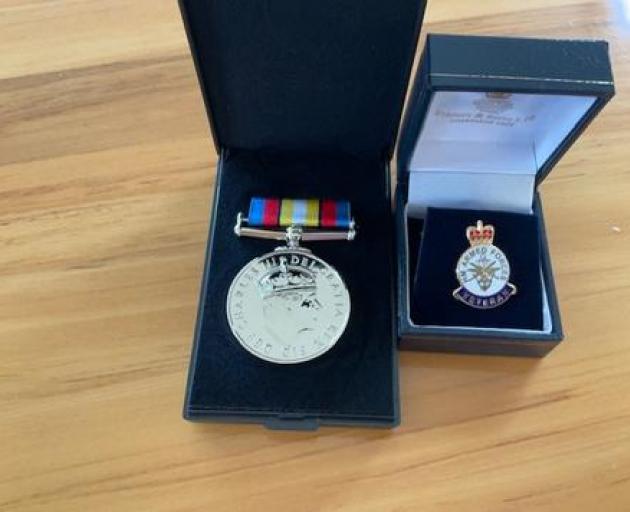
Moncks Bay resident Mike Rossiter was recognised alongside Ernest Robb during an informal ceremony at the Our Lady Star of the Sea Church service last Sunday.
The award was the first military medal issued by King Charles III.
Robb died in the UK in 1996 and his family, who live in Sumner, received the medal on his behalf.
Rossiter was head air technician at the Royal Air Force base on Christmas Island, now part of Kiribati, during Operation Dominic – a series of American atmospheric tests conducted on UK territory.
“You actually felt the heat,” the 84-year-old said.
“You had to face away for the initial blast because even with dark goggles you would be blinded.”
Robb was a squadron leader in the air force and served on Christmas Island during the first series of UK nuclear testing in 1957, codenamed Operation Grapple.
He was a radar specialist and witnessed the first-ever UK hydrogen bomb test from the air in May 1957.

“It’s good to finally have recognition after all these years, that’s the main thing,” said Rossiter.
He served in the air force until 1977 and moved to Moncks Bay in 2007 after two of his three children moved to New Zealand.
Two of his children and three of his grandchildren attended the service to see him receive the medal.
Rossiter’s key role on Christmas Island was to prepare an aerial evacuation in case of emergency.
“We were curious about what we were going to see, what we were going to hear, but everyone was in the same boat so we just got on with the job,” he said.
Many veterans and civilians who lived on the island during the nuclear tests believe they were exposed to negative health effects from the heat and radiation.
“Some people got sick, some people died. Whether they died as a result of radiation sickness, nobody will ever know,” said Rossiter.
The UK Ministry of Defence maintains almost all the British servicemen involved in the nuclear tests received “little or no additional radiation as a result of participation”.
No conclusive links have been made between the radiation exposure and negative health effects for military personnel.
Christmas Island was home to a small population of local I-Kiribati who had to live with the tests occurring offshore.
In 2015, Kiribati’s UN representative Makurita Baaro said “our communities still suffer from the long-term impacts of the tests, experiencing higher rates of cancer, particularly thyroid cancer, due to exposure to radiation”.
Rossiter said the tests were an unfortunate necessity due to threat of the Soviet Union’s nuclear program.
“The Western powers couldn’t just stand by and do nothing. People will debate this, but in my opinion it has actually kept the peace for 50 odd years.”













